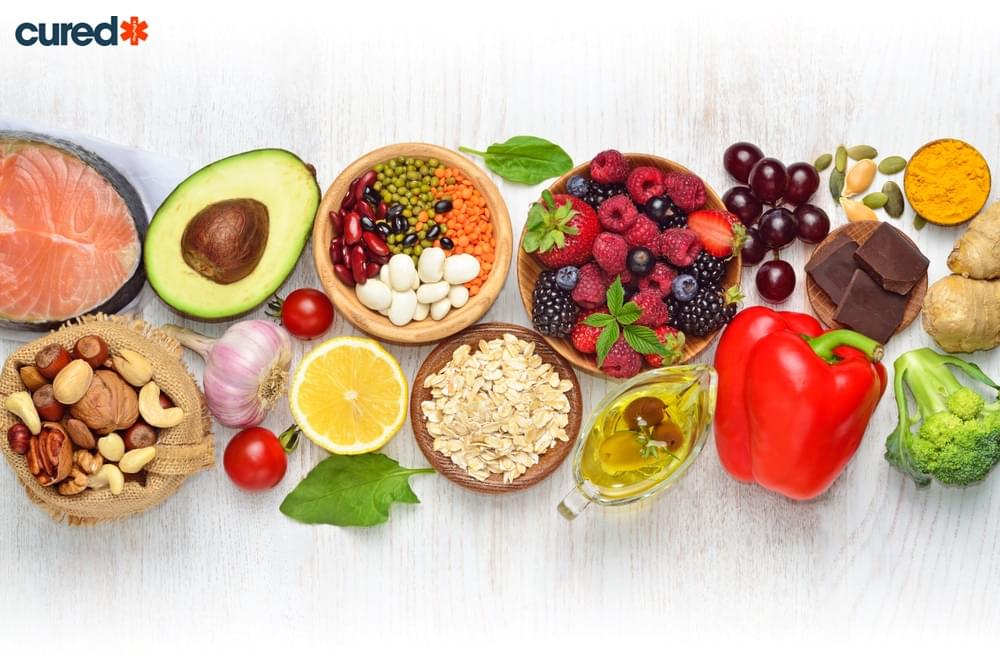Six Essential Nutrients Your Body Needs & their Sources

Choosing fast food over a pack of a nutritional diet is convenient, but the habit can cause havoc for your body & health. To look attractive and feel healthy, you have to take care of what you are putting inside your body.
Per the Work Health Organization, there are nutrients that the human body cannot produce by itself. These are called essential nutrients, and they must be taken in the form of different foods that we eat. These nutrients are essential for proper body functioning, good health, and improved immune system, and disease prevention.
Essential nutrients are broadly classified into two major categories — Macronutrients & micronutrients.
Macronutrients: These are those nutrients that provide energy for your body and are eaten in large amounts. They include protein, carbohydrates, and fat.
Micronutrients: This form of essential nutrients include vitamins and minerals. A small amount can get the job done.
These are the essential types of nutrients your body needs. A Balanced diet must include healthy foods and supplements based on the requirement of your body — and the daily need for nutrients to function your body well will essentially be fulfilled.
Good food that helps with the nutritional needs of your body coupled with regular exercise (both mental & physical) and proper rest are the key components of HEALTH, WEALTH & HAPPINESS. A proper diet will fuel your day and keep you more active in promoting a lifetime of wellness.
Here are seven essential nutrients you must include in your diet:
1. Protein
Protein is a form of macronutrient that every single cell in the body requires functioning properly. Protein is required in the production of some of the most important molecules in the body including enzymes & hormones. It also supports the maintenance of the muscle tissues.
A punch of protein is pretty much helpful in satiating hunger.
Your body goes through a continuous process of using protein throughout the day. And, with that respect, it is essential to take in food that contains protein to maintain that cycle.
Here’s what role Protein plays in our body:
-
Intake of adequate protein everyday nurtures your skin, hair, bones, and muscles.
-
Protein can help your tissues & cells to function properly.
-
Also helps in the formation of hormones & antibodies.
Here’s a list of food that provides adequate protein:
-
Nuts
-
Eggs
-
dairy products
-
fish and other seafood
-
red meats
-
beans and legumes
-
poultry, including chicken and turkey
-
quinoa
Note: While fish and meat are the well-known sources of protein, however, vegetarians and vegans can get adequate amounts of protein from certain plant products.
2. Carbohydrates
Carbohydrates are micronutrients, and like protein, they also act as a fuel for your body. You must include the required amount of carbohydrates in your daily diet as suggested by your dietitian.
Two types of carbohydrates are known — simple and complex. While the body needs only a small amount of simple carbohydrates, and so, you should avoid too much rice, pasta & white bread. However, the body needs complex carbohydrates to support a number of important functions of the body.
-
Digestive function
-
Brain function
-
The immune system
-
Energy
-
The nervous system.
The most established medical experts suggest carbohydrate sources including fruit carbs, whole grain, vegetables, and beans provide around 40% of your daily dose of calories.
Refer to the below list of food that are good sources of complex carbohydrates:
-
Barley
-
Vegetables
-
Fruits
-
brown rice
-
Oatmeal
-
Quinoa
-
baked goods
-
Bread & whole-grain pasta
You should refrain from eating foods that contain added sugars, white flour, and other processed products. The intake of these foods must be limited and you should keep a check.
3. Fat
Foods with high-fat content, - not always bad for your body & health. The human body also needs to consume an optimal amount of fat to get the body functioning properly.
Fats provide energy for your body thereby helping it carry out a variety of functions. But, you need to be careful — and consume only healthy fats that include polyunsaturated and monounsaturated fats. You should avoid consuming trans or saturated food.
Per the Herbalife Nutrition Philosophy, fats provide calories in an extremely concentrated form, and we must avoid consuming more than 30% or less fat in our daily diet. According to a study, a typical diet taken in the US contains more saturated and fats that the body needs — and not the healthy fats that the body actually needs. Healthy fats can come from avocados, olive oil, nuts & fish.
Here’s what functions healthy fats perform for your body:
-
Brain functioning
-
Blood clotting
-
Cell growth
-
Balance blood sugar
-
Building new cells
-
Prevent heart diseases.
-
Helps in the absorption of minerals.
-
Helps in the absorption of vitamins.
-
Immune functioning.
Experts suggest that we must consume 20–35% of calories in the form of healthy fats.
Here’s you should eat to get the optimal amount of healthy fats:
-
Vegetable oils
-
Seeds
-
Nuts
-
coconut oil
-
Fish
4. Vitamins
Vitamins are micronutrients, and they have to play an important role in the plenty of chemical reactions that are going inside the body every day. If you are already up on a balanced diet, you’ll be able to get a number of important vitamins necessary for your body to function properly. A diet containing lots of fruits & vegetables — will provide you with the required amount of vitamins.
Here’s what functions vitamins perform for our body:
-
Strengthens the Immune system.
-
Helps in the proper functioning of the nervous system and brain.
-
Good for healthy skin.
-
Helps in better absorption of calcium.
-
Supports the functioning of bones & teeth.
-
Provides Healthy blood.
There are two types of vitamins — water-soluble & fat-soluble. And, including these two categories, we have 13 different vitamins.
Fat-soluble vitamins: vitamin A, vitamin D, vitamin E, vitamin K.
Water-soluble vitamins: vitamin B-1 (thiamine), vitamin B-12 (cyanocobalamin), vitamin B-6, vitamin B-2 (riboflavin), vitamin B-5 (pantothenic acid), vitamin B-3 (niacin), vitamin B-9 (folate, folic acid), vitamin B-7 (biotin), vitamin C.
If you already include fruits & vegetables in your diet — you are going to get almost all vitamins required. But, if you are not someone who is comfortable eating fruits & vegetables then you’ll need to take supplements so you do not suffer any deficiency.
5. Minerals
Minerals are also a form of micronutrients like vitamins. Minerals are divided into two major forms — trace minerals & major minerals — both of which are necessary for a healthy body.
Major minerals: magnesium, calcium, phosphorus, sulfur, sodium, potassium, and chloride.
Major minerals help in the body in performing many functions including:
-
Supports bone health.
-
Good for hair, nails & skin.
-
Help in maintaining water content in the body.
Trace minerals: iron, selenium, zinc, manganese, chromium, copper, iodine, fluoride, Molybdenum
Trace minerals are responsible for supporting the following functions in the body:
-
Supports bone health.
-
Supports blood clotting.
-
Maintains ideal blood pressure.
-
Prevents tooth decay.
-
Carries oxygen to different parts of the body.
Here’s what you can eat to make sure that your body is getting enough minerals:
-
whole grains
-
leafy greens
-
Fruits
-
vegetables
-
Seafood
-
beans and legumes
-
red meats
-
iodized table salt
-
nuts and seeds
-
dairy products
-
egg yolks
6. Water
Water typically makes your body free of toxins. Dehydration can very badly affect your body — causing mental & physical dysfunctions. Dehydration can cause extreme headaches. The human body is made of almost 60% water and is very essential for it to function properly.
Here’s how it helps your body:
-
Fluxes are toxic.
-
Lubrication
-
Shock absorption
-
Preventing constipation
-
Transports nutrients across the body.
Water in its purest natural form is the most reliable source of water. However, people who cannot drink water in its plain form can add a pinch of lemon or can rely on certain fruits like cucumber that have high water content.
Tour Price
Our private tours typically range from $500 - $1000 per person/per night depending on chosen hotels and room categories, vehicles used, types of tours, flight cost, time of year and other factors. Make an inquiry for a customized trip quote.

